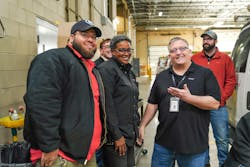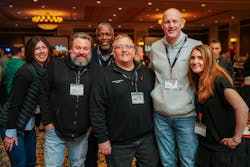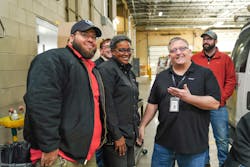Q&A With Doug Sullivan, Vice President, Network & Field Operations, Verizon
ISE: Why did you join the military? Please share your service branch, date of enlisting, and where you served. Please share any medals, awards, or citations you earned.
Doug Sullivan: I joined the military as I grew up in a patriotic family with a deep love and appreciation for our country. My father served in the Marines, always reflected on that experience very positively, and credited his future success to the foundation established with his military service.
I attended the U.S. Naval Academy immediately after graduating from high school. After graduating and being commissioned as an Ensign in the Fleet, I was assigned as the Boilers Division Officer onboard the USS Cleveland (LPD-7) out of San Diego, California. I later served as the Navigator on the same platform.
The USS Cleveland (LPD-7) was deployed in support of Operation Desert Shield and Desert Storm, and upon returning to the States, it was deployed in support of Counter Narcotics Operations in the Pacific and Caribbean.
My second tour on active duty was at the National Security Agency.
After being honorably discharged as a Lieutenant Commander, I was hired by Bell Atlantic Communications, which eventually became Verizon after several mergers. While working for Verizon, I continued to serve my country as a Naval Reservist and was activated in support of Kosovo operations and the Second Gulf War.
In the Service, I was awarded the following: the Joint Service Commendation Medal, The Joint Service Achievement Medal, three Navy Achievement Medals, The National Defense Service Medal, The Southwest Asia Service Medal, the Outstanding Volunteer Service Medal, the Armed Forces Reserve Medal, the NATO Service Medal, Liberation of Kuwait Medal, and an Expert Pistol Medal, along with the following Ribbons: the Joint Meritorious Unit Award, The Navy Unit Commendation, Navy E, Navy Sea Service Deployment, and the Navy Overseas Service ribbons.
ISE: What was your job assignment? What key activities did you perform, and in what circumstances/conditions? What people or resources were you responsible for in this role?
Sullivan: Starting my career in the Fleet as a Boilers Division Officer on the USS Cleveland (LPD-7), we deployed from San Diego, California, to the Persian Gulf to support the first War with Iraq. The team I led worked through some of the most challenging conditions I have ever seen, but they never relented in their commitment to the mission, which was very inspiring. Being a part of that team showed me that while the U.S. Navy had incredible technology and capabilities, it was the people who were the true strength of the organization. In my second career at Verizon, I have made the same observation. While we have the best network, we also have the best people dedicated to their jobs and to supporting each other to ensure that we deliver for our customers.
A quick comment to put some context around the working conditions that those working onboard the ship in the engineering department would routinely endure. While deployed in the Persian Gulf, the Boiler Room would get so hot that the watch teams would have to wear cool vests with ice packs inserted to keep their core body temperature from overheating, and the amount of time that they could medically be approved to stay in the space was restricted to short durations. Performing such physically and mentally challenging work in a dangerous environment for months was awe-inspiring. It elevated my appreciation for the men and women serving our great country in many capacities.
ISE: Why did you choose telecom as a career? How did your service and experience affect your career choice?
Sullivan: Completing my second rotation as a commissioned officer at the National Security Agency, I was approaching a rotation back out to the Fleet. When looking at options in the civilian world, I interviewed with several companies and was fortunate enough to receive some attractive offers. I was intrigued by Bell Atlantic. They valued leadership and continued investing in their network, technology, and people. It was a natural fit, and I enjoyed an amazing journey with them. Even after serving in the Navy on behalf of my country, where I got to see the world, I have worked in more countries as an employee of Verizon than I did in the service. The opportunities to work in engineering, wholesale, enterprise, global repair, regulatory, and field operations, to name just a few, have all contributed to what has been an amazing journey.
ISE: Share your role at Verizon now, your primary responsibilities, and why you recommend other vets enter the Telecom/ICT industry.
Sullivan: I lead the Business Operations Support team for Field Operations within Verizon’s Wireline Network. My primary responsibilities include the support of our 20,000+ field forces, including the construction, installation, and maintenance technicians, as well as our central office technicians and our customer and operations support centers.
The Telecom/ICT industry is a great environment for veterans to pursue a career. The industry always needs veterans, as their knowledge, background, training, and leadership experience are all skills that immediately translate and bring value to the organizations they join.
Verizon has been ranked the #1 Military Friendly Company three times and #1 Best for Vets twice, amongst several other awards, which we take great pride in.
Military service imparts both hard and soft skills that are highly valuable. Those skills include engineering, communications, intelligence, cybersecurity, supply chain management, and finance experience. At Verizon, such knowledge translates into a variety of critical jobs. For example, we seek military-trained engineers to build our best-in-class networks and protect them from cybersecurity attacks. We also find that veterans generally excel as project managers, particularly in coordinating supply chains and logistics.
In addition to technical expertise, veterans bring essential interpersonal skills to the table. The military is a melting pot of highly qualified candidates from across the country and requires individuals with different backgrounds, cultures, and experiences to work alongside each other. During their tenure, service members also learn situational awareness and understanding of the geopolitical and cultural dynamics around the world. This exposure to a wide variety of environments trains service members to adapt rapidly to changing circumstances. Today, more than ever, these qualities are invaluable in the business world. We enthusiastically recruit, retain, and engage the military community.
ISE: How does your experience in the military aid your ability to work under pressure?
Sullivan: I am incredibly thankful for my military experience, which has helped train, develop, and provided me with experiences and opportunities to learn, grow, and evolve my leadership skill set. One of which is how to handle pressure. Through real-world engagements around the globe at a very young age that helped me try, fail, succeed, develop, and grow, I learned how to handle pressure and deliver results.
ISE: Share 1-2 work-related accomplishments you are particularly proud of. What is the “secret” to your success?
Sullivan: Regarding work-related accomplishments, one of the efforts I am most proud of is working with the team to improve the quality and performance of our Fios network significantly and leading an incredible team that set performance targets far beyond what was considered achievable and then surpassed those targets, increasing our customer satisfaction and delivering significant savings to the company. The secret to that success was embracing change, challenging the status quo, and always keeping sight of the customer.
ISE: McKinsey’s study on “The Next Telco Battleground”1 shares that the network engineering talent of operators needs to move beyond specializing in radio capabilities. With virtualization becoming prevalent, differentiation will rely on a broader range of tech skills and capabilities. Operators and recruiters can and should seize this opportunity by empowering the digital natives they may already have on their teams. Share how Verizon works to meet talented digital natives where they are and retain their talent for longer than 2-4 years.
Sullivan: Digital natives want to work somewhere with a mission and purpose they believe in. I think the strength of Verizon lies in our mission to create the best networks that connect people as well as our company’s culture of diversity and inclusion.
When it comes to retention, employees who are given the opportunity to challenge themselves, grow, and develop will be more likely to stay with the company. At Verizon, we have many growth and development resources. Our company culture strongly encourages employees to grow their careers—vertically and horizontally—by joining different teams to understand the business from a new perspective.
My organization has a strong college internship program based on relationships with top universities. I assign meaningful projects and provide executive coaching from day one. As a result, we have been very successful transitioning exceptional interns into exceptional employees.
ISE: How do you measure success in your career, and what’s next on your career roadmap?
Sullivan: I measure my career success by the team's growth, development, and advancement. As stated earlier, throughout my career, I have had the great pleasure of working for two technological titans: the U.S. Navy and Verizon. However, the most impressive commonality was the quality of the people. Investing in and developing our people is how I measure our success—leading and inspiring teams to achieve more personally and as a team than they thought possible. Throughout my career, I have seen time and time again that the investment and development of the team yields amazing results regardless of the business unit, project, or initiative.
ISE: The AI Network Intelligence market is forecasted to grow 40% by 2029.2 By 2035, it could improve construction profitability by 71%. Many providers use AI to tame network complexity, reduce OPEX, and enhance network performance management. How is your team using AI now, and how do you expect it to be used across the network soon?
Sullivan: Verizon is very experienced in the use and development of AI. Beyond using the technology for many years, in 2019, Verizon launched an AI and data business unit staffed by a Chief Data Officer to oversee how we develop, manage, and implement AI at the enterprise level.
We use AI for force models to predict growth and capacity needs to ensure that we have the right resources in the right places; we use AI for predictive analytics and insights into network trends so we can proactively address issues before they occur; we use AI to understand customer insights so we can better respond to their needs. We also use it to analyze data and correlate information to predict and avoid network outages more accurately. Another way we leverage AI effectively is to seamlessly incorporate it into our frontline digital tools and system applications that help us better serve our customers. The digital tools we provide to our service reps and technicians help them make the best decisions for troubleshooting and streamlining our installation processes.
Among some notable use cases, Verizon used our own AI platform3 to help build our 5G network.4 The AI models, designed by in-house data scientists, factor in multiple variables that can alter the strength of 5G signals, the position of the transmitter, as well as other nearby transmitters.
ISE: What emerging or disruptive broadband technology excites you the most? Why?
Sullivan: When I talk to customers about their home broadband service, they usually describe their in-home Wi-Fi. This is becoming increasingly important to our customers, with the average number of wirelessly connected devices within the home increasing significantly yearly. So, I'm most interested in seeing how the next generation of Wi-Fi protocol will improve the speed, efficiency, and management of more connected devices.
ISE: What is our industry NOT addressing that it should in terms of network evolution and broadband for all?
Sullivan: It’s moving in the right direction. However, the industry needs to focus on network quality and reliability as the primary metrics rather than the maximum speed a user could get in a perfect-world scenario.
I believe it’s a more indicative metric of the customer’s user experience. This becomes even more important in rural or remote areas where physical broadband connection is the only way customers can connect to the internet, stream video content, or make phone calls.
ISE: Share three things you recommend to other network professionals who want to follow your path.
Sullivan: Three recommendations:
- Take the toughest job. You will learn and grow beyond your expectations, and additional opportunities will come your way.
- Lead by example. Model the behaviors you would expect of others.
- Share success and invest your time, focus, and efforts in your people. I have never regretted investing my time and efforts in my team. Their success is my greatest achievement professionally.
ISE: What’s the most significant professional risk you’ve taken?
Sullivan: The most significant professional risk I have taken is identifying the most significant business challenges and volunteering to take them on. Doing so required me to join a completely different business unit, step outside my comfort zone, and build my reputation from scratch with a new team and organization.
While risky, I have found these opportunities enriching and they have helped position me for roles of increasing scope and responsibility.
ISE: Please share ONE word that encapsulates your leadership style. And ONE word that describes you as a person.
Sullivan: One word that encapsulates my leadership style is transformational. One word that describes me as a person is passionate.
REFERENCES
1. The Next Telco Battleground, https://www.mckinsey.com/industries/technology-media-and-telecommunications/our-insights/the-next-telco-battleground-network-experience-and-competitiveness#
2. AI in Telecommunication Market Statistics 2029, https://reports.valuates.com/market-reports/QYRE-Auto-7L853/global-ai-in-telecommunication
3. AI Platform, https://www.cio.com/article/405371/verizon-wireless-ai-platform-paves-way-for-5g-build-out.html
4. 5G Network Buildout, https://www.wsj.com/articles/verizon-enlists-ai-in-5g-network-build-out-11628103712
Doug Sullivan is Vice President, Network & Field Operations at Verizon. For more information, visit www.verizon.com. Follow Doug on LinkedIn. Follow Verizon on Facebook and Twitter. Follow Doug on Instagram.
About the Author
Sharon Vollman
Content Ambassador for ISE EXPO
Sharon Vollman is the Content Ambassador for ISE EXPO. She is passionate about collaborating with thought leaders, SMEs and hard-working doers who design, plan and deploy ultra-reliable broadband networks. Vollman is committed to creating a variety of educational offerings for ISE EXPO attendees that inspire them to connect every U.S. citizen with the broadband networks we all want for our children and grandchildren.
Vollman has created educational partnerships with Broadband Service Providers including AT&T, Verizon, Lumen, Frontier Communications and others. She has covered the telecom industry since 1996.



